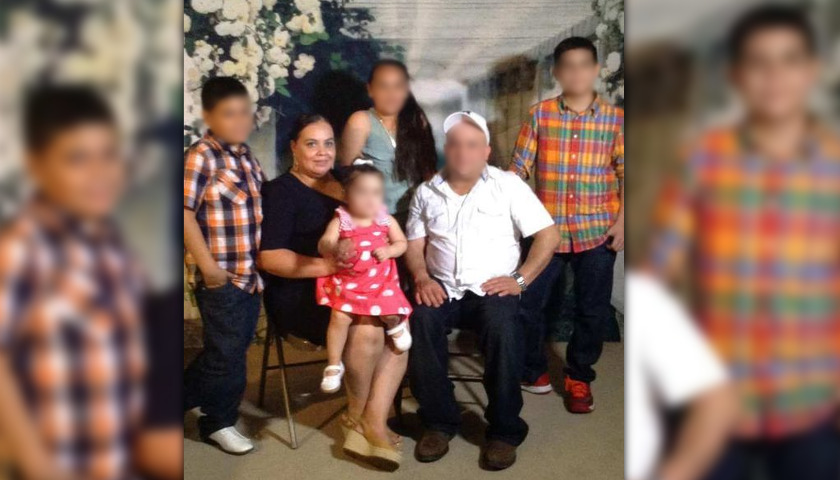A mother of four who was deported to Mexico after living and working illegally in the United States for 15 years has been flown back to the U.S. and granted an asylum hearing, according to the law firm Advocates for Basic Legal Equality.
On Monday morning the Dayton law firm confirmed its client, Maribel Trujillo Diaz, has returned to the United States from Mexico.
Trujillo Diaz was reportedly reunited with her four children in the Fairfield, Ohio area. She will attend immigration hearings in Cleveland, according to a report by WCPO ABC 9 in Cincinnati.
Open-borders advocates have created the Twitter hashtag #MercyforMaribel in an attempt to garner public sympathy for her case.
ABLE attorneys said the United States government returned the deported woman to Ohio for her upcoming proceedings.
It is unclear whether she will remain in the U.S., or how long she will stay. She could return to Mexico and bring her children with her but claims her family would be unsafe in their home country.
St. Julie Billiart Catholic Church in Hamilton, Ohio, under the direction of Father Michael Pucke has been helping Trujillo Diaz with her asylum case.
In June, immigration officials agreed to reopen the case of Trujillo Diaz, who arrived in the U.S. in 2002 and became known to authorities during a 2007 raid on the meatpacking operations of Koch Foods, where she was apparently working illegally.
The owner of Koch Foods is Joe Grendys, a Chicago billionaire and the 375th richest person in America. The meatpacking industry is famous for employing illegal aliens as a source of cheap labor. After the George W. Bush administration started raiding meatpacking plants and arresting illegal workers, the industry started shifting from illegal Latin American labor to legal refugees being permanently resettled in the U.S. from the Middle East and Africa by Catholic Charities, Lutheran Social Services and other federal resettlement contractors. The contractors get paid by the federal government for every refugee they resettle in the U.S. and then turn around and lobby Congress for more refugees every year, while almost no member of Congress questions their conflicts of interest.
After she was singled out by immigration authorities for her illegal status, Trujillo Diaz applied for asylum, but her application was denied, according to WCPO. She was arrested on April 5, 2017.
By April 19, she was back in Michoacan, Mexico, and she is now claiming that her family has been threatened by gangs.
This may or may not be the case. But, traditionally, gang violence and domestic abuse, the two most common reasons given today by Latin American women seeking asylum in the U.S., were not reasons for automatic asylum under U.S. law, notes Ann Corcoran, who has been following the growing refugee/asylee movement for the past 12 years.
My, how things have changed.
“This whole idea that everyone subjected to domestic abuse from their husband or boyfriend on the one hand deserves asylum, and everyone who feels threatened by gangs on the other, has become very entrenched over the last decade or so,” Corcoran said. “The immigration attorneys are taught this in the universities, and of course Obama put hundreds of left-wing judges in place who affirm this concept. But this whole business of running from crime is not even supposed to be a reason for asylum.”
Attorney General Jeff Sessions is trying to return the immigration system to its legal moorings.
Sessions issued a rule in June that states “private crime” should no longer be recognized as a justification for asylum, setting off a fury among the leftist media and NGOs. They claimed Sessions was “hijacking immigration law” and attempting to rewrite it while ignoring the fact that he was actually returning to the enforcement of existing laws that Obama, and to some extent George W. Bush, had ignored.
“The left has for years been trying to expand the definition of asylum to include women claiming their husbands or boyfriends were beating them, while the other big excuse given by illegal border-crossers is ‘running from Ms-13.'” Corcoran said. “But traditionally under U.S. law you were supposed to prove you were fleeing religious, ethnic or political oppression, not some private crime.”
And there were good reasons for not including private crime as justification for asylum. For starters, it is incredibly difficult to prove that a person is not only a victim of private crime but that the person must come to the United States in order to escape the crime. Oftentimes moving to another city or province within their home country could be just as effective in escaping the violence.
A federal appeals court in Cincinnati ordered immigration officials in January to re-examine Trujillo’s case.
According to the three-judge panel, the Board of Immigration Appeals had “abused its discretion” and failed to consider the testimony of Trujillo Diaz’s father, who said their family and Trujillo Diaz specifically had been targeted by cartels.
A “welcome home” prayer service for Trujillo Diaz will be held at 7 p.m. Tuesday at St. Julie Billiart Parish at 224 Dayton St. in Hamilton.
– – –
Anthony Accardi is a writer and reporter for The Ohio Star.





